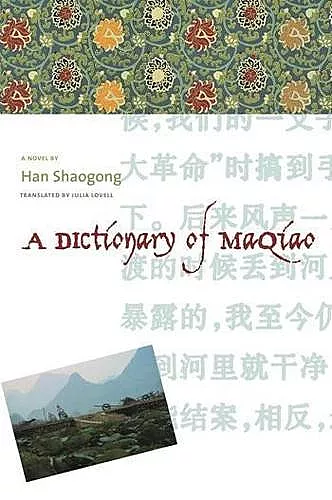A Dictionary of Maqiao
Shaogong Han author Julia Lovell translator
Format:Hardback
Publisher:Columbia University Press
Published:15th Jul '03
Currently unavailable, and unfortunately no date known when it will be back

One of the most-talked about works of fiction to emerge from China in recent years, this novel about an urban youth "displaced" to a small village in rural China during the Cultural Revolution is a fictionalized portrait of the author's own experience as a young man. Han Shaogong was one of millions of students relocated from cities and towns to live and work alongside peasant farmers in an effort to create a classless society. Translated into English for the first time, Han's novel is an exciting experiment in form-structured as a dictionary of the Maqiao dialect-through which he seeks to understand and translate the local life and customs of his strange new home. Han encounters an upside-down world among the people of Maqiao: a con man dupes his neighbors into thinking that he has found the fountain of youth by convincing them that his father is in fact his son; to be scientific" is to be lazy; time and relationships are understood using the language of food and its preparation; and to die young is considered "sweet," while the aged reckon their lives to be "cheap." As entries build one upon another, Han meditates on the ability of a waidi ren (outsider) to represent the ways of life of another community. In this light, the Communist effort to control the language and history of a people whose words and past are bound together in ineluctably local ways emerges as an often comical, sometimes tragic exercise in miscommunication.
The best novel of the year isn't that DeLillo-on-automatic-pilot thing that broke out, along with SARS, this spring; nor the smutty anti-Islamic screed by the super-annuated French juvenile delinquent; nor even Jane Smiley's excellent investigation of the unlikely souls of real estate agents. Rather, it is this 'dictionary' of the dialect of a fictitious village, Maqiao, lost in the squat hills of South China. San Francisco Chronicle Book Review [A] subtle and smashingly effective critique of the futility of totalitarian efforts to suppress language and thought-and, more to the point, a stunningly imaginative and absorbing work of fiction. Kirkus Reviews [A Dictionary of Maqiao] is a magnificent book, epic in its ambitions and sweep without any of the sentimental obfuscation on which that genre so often depends. The Village Voice [B]oth fascinating and masterful... Han paints a detailed, intriguing and amusing picture of what happens when Marxism collides with entrenched village beliefs, and how traditional China coexists with modernity. The book is filled with peculiar, beguiling, tragic characters and scenery so real you can touch it... This is an intelligent, amusing, clever, fascinating and well-written view of a China most of us never see, or don't recognize when we do. Asian Review of Books To enter [A Dictionary of Maqiao]'s pages is to cross into a world of bandits and ghosts, where 'rude' means 'pretty,' and homosexuals are 'Red Flower Daddies' and people don't die, they 'scatter.' The New York Times Book Review Dictionary of Maqiao is a wonderful, many-layered novel written as a series of definitions which gains further depth from a good translation... Han Shaogong's novel [is] clever, sympathetic and amused... Julia Lovell's translation is an impressive achievement, a fine reflection of a complex book. Times Literary Supplement Han Shaogong's novel has won wide acclaim, and deservedly so; through his treatment of language, he not only vividly portrays village life in rural China, but also inspires readers to rethink what they are accustomed to taking for granted. Persimmon Sometimes humorous, but crude and grim at other times, the entries all intertwine to give readers a picture of life in this distant region. Library Journal The narrator's folkloric stereotypes the provincial simpletons and fools, the cuckolded husbands, the long-suffering wives resolve affectingly into distinct human beings. And the peasant vocabulary vulgar, quaint, superstitious which so perplexesthe earnest young outsider is also revealed to be cunningly subversive, an antidote to the totalitarian imposition of a "reality"irreconcilably at odds with the real thing. -- Amanda Heller The Boston Globe This is a serious, ground-breaking and finally brilliant novel by one of China's leading authors... The translation is everywhere excellent-fluent, colloquial where appropriate, without being excessively so, learned in places, and without any hint anywhere of 'translationese'... surely destined for classic status. -- Bradley Winterton Taipei Times In its formal inventiveness, its nuanced depiction of Chinese peasant life, and its speculative explorations into the Chinese cultural psyche, this is one of the finest novels of the post-Mao era to so far make its way into English. -- Jeffrey Twitchell-Waas Review of Contemporary Fiction Worth reading...fascinating and surprisingly accessible. -- Anton Graham China Economic Review Han is a good storyteller, ingeniously leading the reader into the heart of his stories...A Dictionary of Maqiao is readable and enjoyable. -- Fatima Wu World Literature Today
- Winner of Newman Prize for Chinese Literature 2011
ISBN: 9780231127448
Dimensions: unknown
Weight: unknown
400 pages